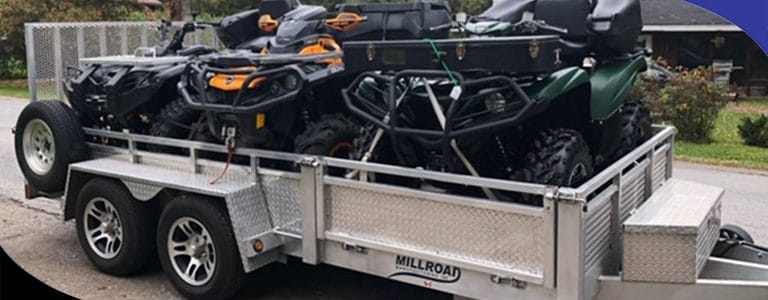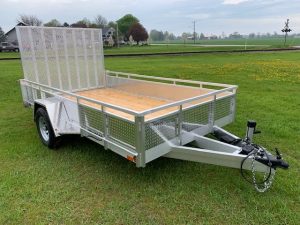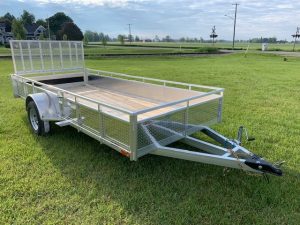
How To Properly Distribute Weight on Your Trailer
Ever see an overloaded trailer pulled by a small truck? It isn’t pretty. Don’t make the mistake of piling your trailer high, strapping it all down and thinking it can safely haul any load. Just because it fits on the trailer bed doesn’t mean you should haul it. Learn how to properly distribute weight on your trailer, and spot the signs of an overloaded trailer. Find out why an Millroad aluminum dump trailer can be the perfect option for your heavy-weight hauling.
How Much Weight Can a Trailer Carry?

Trailer weight limits vary dramatically. Before you try to balance out your load, make sure you’re not trying to fit too much on your trailer. An overloaded trailer can be dangerous. To find out how much your trailer can hold, you need to know your gross vehicle weight rating (GVWR), total trailer weight and gross axle weight rating (GAWR).
The GVWR of your trailer should be on its VIN label. This number can be tricky; it’s not the actual amount your trailer can hold, but it’s the maximum weight allowed for your cargo and trailer together. Find out the trailer weight and subtract this from the GVWR to find your maximum cargo weight.
How To Distribute Weight
Knowing the total weight for all your cargo is only half the battle. Now you need to be sure it’s properly distributed. There are a few basic ways to balance out the weight to be sure it’s not overloading any axle of the tongue. First, look at the GAWR. This tells you the amount of weight the trailer’s axle can hold. If your trailer has two axles, it should have a front axle and rear axle GAWR.
Try to keep about 60% of the load in the front half of your trailer. Don’t overload the end of the trailer, or it could damage your trailer and cause other hazards. Try to keep your GVWR to about 80% of the allowed amount. This means that the total weight of your trailer and cargo should be well below the GVWR printed on your trailer’s VIN label.
After figuring out a safe front/back load scheme, check the left/right load. This should be reasonably balanced to protect your trailer and truck from any damage. It also improves your stability and handling on the road.
Finally, don’t forget to check out the weight rating of your truck. Not all trucks can handle extra-large loads. Your truck also has a GVWR, so be sure you aren’t overloading your truck’s towing capability. The last part to check is your hitch. Even your hitch has a maximum weight load. If you overload the tongue of your trailer and don’t have a heavy-duty hitch, you run the risk of breaking your hitch and causing a serious accident.
The Dangers of Poor Weight Distribution

Here are some risks you face if you overload your trailer. If you have a reliable truck and trailer, these won’t apply to you, but it’s important to remember how series it is to have an improperly loaded trailer. Improper weight distribution can cause your trailer to pull dangerously to one side.
Even worse, it can damage your trailer, hitch or truck. This could cause an accident that affects you and other drivers. Extreme weights may not be allowed on certain backroads. Check with your local regulations to see if you need a special permit to haul extra-heavy loads.
Choose a Heavy-Duty Trailer To Increase Your Weight Rating
Stay safe by choosing a trailer that’s rated for your intended load. Contact us at Millroad Manufacturing to discuss our custom aluminum trailers. Our trailers are lightweight and capable of hauling heavy loads safely, so they’re ideal for your heavy-duty hauling needs.